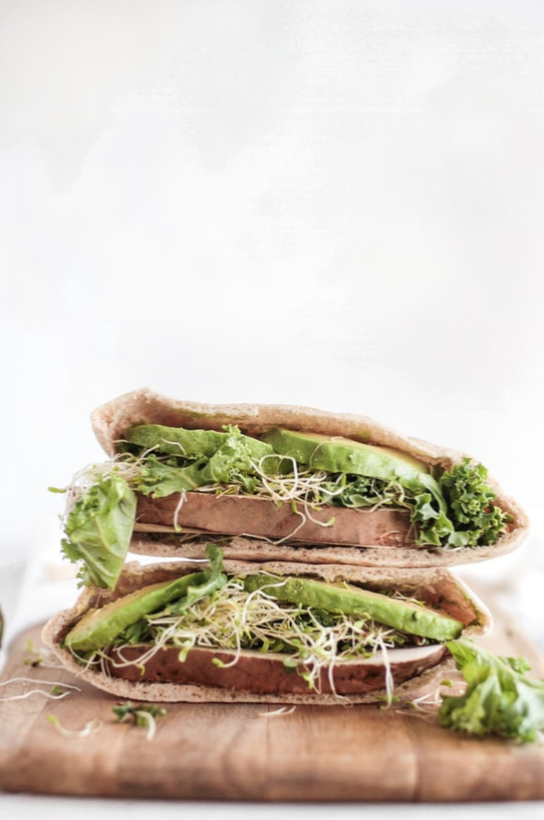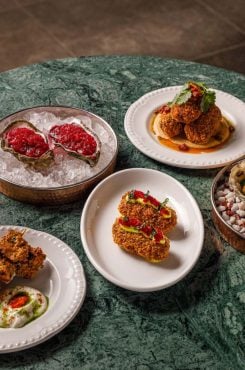Steaks at steak: The rise of veganism
Published 17 January 2019
by Josh Barrie

The rise and rise of veganism is inescapable and has much to commend it. But where does it leave those restaurants who focus on meat? Josh Barrie talks to leading industry figures about their response to our changing eating habits
The rise in plant-based living
Plant-based living has never been more in vogue. Just ask restaurant critic William Sitwell. For him, it proved hugely disruptive: in November, the Waitrose Food editor resigned under a cloud from a position he had held for nearly 20 years following a crass joke he made about vegans.
Consumer culture and restaurants have never been more entwined. Usually, restaurants lead the way when it comes to food trends: experimental dishes begin in top kitchens, filter into high street staples, and then hit the supermarkets; the mainstream.
Veganism is the other way around. Supermarkets have arguably been quicker to identity that market because brands have to cater for everyone. Niche restaurants, meanwhile, stand by their concept, be it prime rib or lavish hot dogs, and are often unwilling to budge. But now, according to Waitrose (and numerous other reports), one in eight people are either vegan or vegetarian; a third are looking to actively cut down on meat. Flexitarianism is growing formidably and the trajectory is clear.
Indeed, whether health, the environment, or animal welfare is the spark, vegans are no longer the irritating minority, hiding in sheds, riding bicycles and handing out Green Party leaflets in Brighton. And vegetarians aren’t that one person you invite to dinner, their ‘on my way text’ instigating a frantic aubergine parmigiana and an extra loaf of bread.
Response from the industry
An overlooked importance in all this isn’t who eats what and why, it’s how the industry evolves and responds. As the great Richard Corrigan recently said in The Times, a sense of common ground is imperative.
So while a heightened focus on plant-based living is pertinent, here we ask: what about the other side – the restaurants and restaurateurs to whom meat has always been front and centre? What about Hawksmoor, an institution of a modern steakhouse where quality beef is the emphasis and vegetables are – as has been the tradition up to now – very much a side gig?
Scott Collins, MEATliquor
What about MEATliquor (the clue’s in the name)? If everybody is shunning meat, be it forevermore or in a consciously flexible fashion, are its creators not worried? Should they not be reacting and shifting their position?
MEATliquor’s co-founder and managing director Scott Collins tells CODE: “Meat is in our name, and we’re always going to be that sort of restaurant. It’s too late to change now. But I don’t think we need to change our whole concept – and I wouldn’t want to.
“We’ve always had vegetarian diners. At the beginning, we wouldn’t change anything on the menu. Now, we’ve given some ground and concede we have to. It’s important to adapt to the market.
“It was the same with gluten-free options. I’ve found that to be a bit of a ‘vegan diagram’, I suppose – there are people who avoid certain foods. The main thing is we’re trying to say ‘no’ less. So, yes, we’ve changed tack a bit. But actually, you can put a positive spin on this – it’s a new aspect to the market and a new way to attract diners.”
We all know how challenging – this itself is an understatement – the hospitality trade is right now. Collins suggests vegetarianism and veganism might in fact be a way of pushing for buoyancy.
“We’ve got to be progressive,” he says. “This business is terrifying and exhausting, but we’re seeing good things happen too. These days, you’ve got parents who used to come in when we started, now coming in with their kids. Everything is changing.”
MEATliquor has long been a trendsetter. It’s always had imitations. With flexitarianism rising, one day it might be more of an anomaly. The market is saturated – pop-ups these days are more likely to be of carrot and seed than of juicy steak dripping in cheese. But while there’s room for a genius burger in the midmarket, there’s also the high-end to consider. What about the bastions of carnivorous indulgence, the London steakhouse, where suits sit behind the finest of red wines?
Florian Siepert, Goodman Mayfair
Florian Siepert, an experienced restaurant manager currently in charge of Goodman Mayfair, tells CODE: “I don’t think top steak restaurants need to worry. While plant-based choices and lifestyles are growing in popularity, it’s also important to note that it’s still predominantly wealthy and educated people.
“We’re not ever going to appeal to everyone. But we are perfect for people who opt out of meat three or four, even five days a week, but want something special when they do eat meat. It might be a special occasion, and our meat is higher welfare; it’s premium, so it works.”
Goodman might be a point of excess. In fact, the high-end may even benefit from the rise in plant-based influences. If we all abstain from the cheap meats Monday to Thursday, then look out for tenderness to satiate our animal desires come Friday, somewhere like Goodman would definitely be high on the list.
“Yes, we are a good option in that regard,” adds Siepert. “Though that’s not to say we’re not accessible. We also do dishes such as steak frites. Meat has always been an aspirational thing and it should be available to all consumers. But it’s true that restaurants will have to rethink. I know a lot of places are clinging on for dear life, and think anyone who makes it through this year will have done an exceptional job.
“So in a differing market and in the industry as a whole, we all have to be reactive and reflect consumer trends. We’ve got to be creative. Above anything, it’s not about a concept – it’s about keeping going.”
Like Collins, Siepert is largely positive: “There’s been a proliferation of knowledge in London in the past decade and an understanding of food has permeated through kitchens. We can all benefit from this and plantbased dining is just another thing we can work with in a tough period.”
Will Beckett, Hawksmoor
Hawksmoor’s Will Beckett echoes these sentiments. Vegetables are not alarming. They’re good news, actually. “I think that the bigger trend is a general interest in the link between food and health, between food and animal welfare and between food and sustainability in its many guises,” Beckett says.
“Vegetarianism and veganism often have their roots in one or more of those concerns and so does Hawksmoor. We’re doing so [offering an all-encompassing menu] proactively rather than reactively I think – we’ve always wanted to do vegetarian well.
“We also have Foxlow, which is a more overtly ‘flexitarian’ kind of restaurant where we get to indulge our love of vegetables much more.”
Beckett mentions his mum as an example of something looking to cut down on meat, but who won’t shy away from London’s famous haunts.
He says: “My mum has dramatically reduced her meat intake, but not in a way that would stop her going to Hawksmoor. She’s cut out cheap meat (where she knows the ethical standards are likely not great) or meat at places where she can’t be sure they pay attention to the things she cares about (health, the environment, animal welfare etc.).”
With the culinary landscape shifting too, does Beckett have concerns in a broader sense?
“I think the most in jeopardy are the restaurants that don’t keep up with what customers want, and they care a huge amount about having a great meal, being served by people who love what they do and having a good time – those things are still the main reasons people go to restaurants and the places that have struggled have often been places where those three things can’t be said, irrespective of what kind of food they serve.
“I think there’s a clear place for restaurants like ours, but I think the dinosaurs that serve any old meat with scant regard for sustainability issues are likely to make way for restaurants who do it with a sensibility to the kind of issues we’ve discussed today.”
Rupert Power, Sophie’s
Like Hawksmoor, Sophie’s – which has two outposts, in Mayfair and Soho – puts quality and welfare on a pedestal. The restaurant sources its meat from Warrens in Cornwall. Cattle roam free on Bodmin Moor.
In the Soho branch, proprietor Rupert Power has installed a huge fire pit, where slabs of prime rib and other meats are sat over flame, fat rendering and meat colouring. Are vegans not put off with such a scene? Has footfall fallen?
“We focus on appealing to a broad market,” Power explains. “When customers do want a steak, they go to trusted sources, where it’s about top produce cooked well. On our firepit, vegetables are cooked too. We have always been proactive. There are steaks, but there are ash-baked sweet potatoes too, for example.
“I think Sophie’s really does lend itself to flexitarianism. We’ve never been one of those alpha male steakhouses you find in New York. Even our decor reflects that. We have built an experience suitable for everyone, we always have – but that’s not to say we’ll continue to adapt. I think we have to. It’s obvious and we will.”
It is clear that restaurants, midmarket and high-end, have an eye on plant-based goings on. And as these restaurateurs exemplify, a willingness to adapt is crucial. We’re not going to lose the glorious steakhouse or the loud burger joint anytime soon. If anything, veganism will sift out the ones we don’t need, and propel those we ought to be going to, come the weekend after our week-night chickpea curries.
This article was first published in Issue 17 of CODE Quarterly




